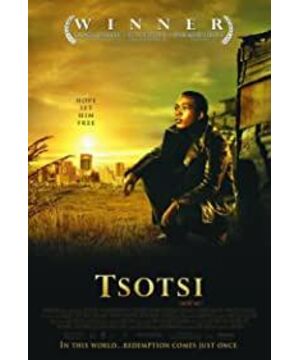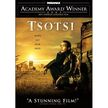Haoyue's translation of foreign language film titles into Chinese is still very exciting and convincing, which is rare. However, the renaming of "The Gangster", which was released in China in July, won my heart. This film, which won the 78th Academy Award for Best Foreign Language Film, cleverly bypassed the strict film censorship by changing its name and became the This is the only Oscar-winning film that can be screened in China. In addition to agreeing with the serious and responsible leadership of the film bureau, I support the renaming of "The Gangster" to "Redemption", and the more reason is that I think "Redemption" can express the theme of the film more intuitively than "The Gangster". To be sure, this is not a gangster movie, but an emotional and sad male movie, and to a certain extent, more like a tear-jerking literary film.
I admire director Gavin Hood, he understands what kind of opening a commercial film should use to attract audiences. In a dark town near Johannesburg, the capital of South Africa, gambling and fighting can break out in bars at any time. Under the leadership of the leader, several young gangsters swaggered through the cluttered streets, silently inserting sharp blades in the subway and being robbed. The heart of the reader... In the first 15 minutes of the film, the violent color of the film is heart-pounding, and Tsotsi, played by Presley Chweneyagae, is a small but sharp-eyed and murderous. Filled with brutality, he even followed an old beggar who was begging in the subway to give him an unfriendly look, and then followed him into the wilderness and tried to shoot him. However, after injuring a female car owner, stealing her car, and finding a baby in the car seat, Tsotsi's life is changed because of the crying child, and the whole movie is a watershed moment. A series of heartwarming shots to show how a heart once filled with violence is gradually softened.
As a windfall from the robbery, Tsotsi's initial idea was to abandon the baby in the wilderness, but the baby's loud cries soon brought him back. Recalling this scene while watching the full movie, I guess there must have been an electric light flashing in his mind before he turned and ran to the back of the car to pick up the baby, and it stinged his feelings for The memories of his sad childhood awakened his need and thirst for love, and inspired the fatherly love hidden in the depths of every male's heart. Most importantly, the weak child made him temporarily forget his "gangster thug" identity. Restoring him into an ordinary man between a teenager and his father made him realize that his status as a strong man could not only be used to plunder and destroy, but also to give and protect. Since then, a Chinese movie has begun to focus on the familiar story mode of killers and beauties, but in "gangsters", the beauties become children, but this is not important, the director seems to know better, "Young Wuyou, and people "Youth" can touch the hearts of the audience more than heroic beauties.
A person is often clumsy when faced with things he is not familiar with, and this clumsiness facilitates the discovery of his essence. Every time I see Tsotsi carefully carrying the baby around in a cardboard bag, or scrambling to open a can to feed the baby, I can't help but burst into laughter as I look at this image of a protective baby. The guy who ran around like a male dog, mocking him in his heart, "I didn't expect you to have today." The helpless Tsotsi finally did a stupid thing that looked extremely stupid, sneaked into the house of Miriam, a female neighbor, and raised a gun Forcing her to breastfeed the child she stole. The kind and calm Miriam, the happy child lying in his arms, makes Tsotsi hallucinate. Family, mother's love, food, warmth... these things he lacks, seem to be realized through that child one by one. And Miriam's home made wind chimes made of waste glass, which he thought was garbage, but Miriam told him that the wind chimes could see wonderful flashes and hear pleasant sounds. Having two diametrically opposed views on one thing made Tsotsi understand that poverty and suffering were not reasons for his violence. Because the old beggar "lived as a shame as a dog", he almost ended his life, and the old beggar's wish to be in the warm sunshine also gave him an epiphany that his former gang life was not what he wanted of.
When he sneaked into the baby's father's house with his companions and was about to rob him again, he found a warmly furnished baby room. The baby, who should have enjoyed a comfortable life in this house, was deprived of this right because of his actions. The painful Tsotsi was already reluctant to return the baby who was with him day and night, but his conscience forced him to do so. For this reason, he shot and killed his companion who had not changed his brutal habits. Babies lose their fathers. After fleeing in panic, he went to Miriam's house to retrieve the baby. Before returning the baby, he took the baby to see the place he once "lived" - the cement pipes accumulated outside the wilderness. This is how Tsotsi says goodbye to the baby. When he was sending the baby to the gate of the hospital, after hesitating for a long time, he rang the doorbell, and the police also surrounded him. The police with guns, the flashing lights, the mother who became so excited because of her hatred for him, in the tense atmosphere, he hugged the baby tightly. In the end, his father, who had saved his life, took the child from him, and he was so sad that he couldn't help himself.
From the violence at the beginning of the film to the softness at the end of the film, the contrast between the two styles makes the theme of "redemption" of the film clear. If the protagonist in "The Shawshank Redemption" completes his self-redemption because of his desire for freedom, then Tsotsi in "The Gangster" is the recovery of conscience and the repentance from the bottom of the heart. This kind of redemption is equally shocking. human mind. In addition to the two themes of violence and redemption, the film also has a thread running through it, and that is love. A gangster's love for an unfamiliar baby, a female neighbor with her own child's love for a baby that has nothing to do with her, the heart-wrenching love of a parent who has lost her child... On a deeper level, it is Tsotsi's love for being hurt by himself The love of a friend of mine is the love of his parents for Tsotsi—although this love manifests itself in the form of forgiveness, but who can say that forgiveness is not a kind of love? Under the guise of a gangster movie, "Gangster Thug" focuses on the group at the bottom of the society. The "big love" of this group, on the one hand, dispels the pain caused by the difficulty of survival, and on the other hand alleviates the stimulation of social contradictions , Tsotsi and wealthy families at the bottom of the society finally completed the handover between the children, which not only means the reconciliation between the two, but also means that the two classes begin to understand and know each other. The sense of responsibility embodied in "Gangster Thug" makes it a rare realism blockbuster like "Crash", the best picture of this year's Oscars.
View more about Tsotsi reviews











